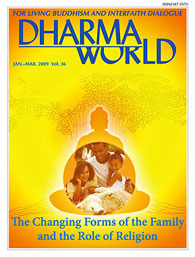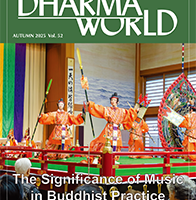January-March 2009, Volume 36(PDF)
The Changing Forms of the Family and the Role of Religion
Bringing the Four Immeasurables into the Family by Takayo Maruyama
In Japan in recent years, there has been an increase in cases of extremely vicious child abuse, parricide, and infanticide. Why should such horrendous incidents occur within families, which are the smallest units of a community, and particularly among immediate family members, who should be the most able to understand one another? No prescriptions have been discovered, either for the root causes or for a strategy to solve the problem, and it seems that both the government and those involved in education are at a loss. . . .
Restoring the Family for Today’s World by Yoshiaki Sanada
The “breakdown of the family,” about which so much is heard these days, is not a phenomenon unique to Japan; neither is it a phenomenon peculiar to our own time.
Until March 2007, Yoshiaki Sanada served as a professor of law at Chuo University in Tokyo, where he is now professor emeritus. He has also been a guest professor at the Institute of Comparative Law of the China University of Politics and Law in Beijing. He is director of the Peace Research Institute of the Japanese Committee of the World Conference of Religions for Peace.
The Role of the Family in a “Glocal” World by Michael Fuss
As families have been bearers of culture in the past, they need to become aware of their new role as heralds of peace and survival for the future of humanity.
Michael Fuss is a professor at the Pontifical Gregorian University, Rome. After ordination as a Catholic priest, Dr. Fuss specialized in Buddhist studies and today is engaged in Buddhist-Christian dialogue. Among his publications is Buddhavacana and Dei Verbum (Leiden: Brill, 1991), a comparative study of scriptural inspiration in the Lotus Sutra and the New Testament.
Why Twenty-first-Century Families Need Faith Communities by Michael A. Schuler
Whatever might be said about the role of religion and citizenship, it is clear that almost two centuries later the family continues to be held in high regard.
Michael A. Schuler has served the First Unitarian Society of Madison in Wisconsin, one of the largest Unitarian Universalist congregations in North America, since 1988. In addition to a master of divinity degree from Starr King School for the Ministry, Berkeley, CA, he earned a PhD in the humanities from Florida State University at Tallahassee.
Putting Our Hands Together Reverently Before Our Families by Nichiko Niwano
Home is the basic place in which we practice religious discipline, a place in which we can directly contemplate the cause of suffering and free ourselves of our selfishness.
Nichiko Niwano is president of Rissho Kosei-kai and the Niwano Peace Foundation, a president of the World Conference of Religions for Peace, and special advisor to Shinshuren (Federation of New Religious Organizations of Japan).
The Family as Focal Point for the Restoration of Inochi by Minoru Sonoda
In contemporary society the very shape of what constitutes a “family” has been in flux in many ways.
Minoru Sonoda is the head priest of the Chichibu Shrine in Saitama Prefecture. He took his doctoral degree at the University of Tokyo in 1965. He was a professor at Kokugakuin University in Tokyo and then at Kyoto University until he retired in 2000, where he is now professor emeritus. He has published widely and has edited many collections and anthologies on Shinto.
The Dharma of Family by David R. Loy
Family crisis and breakdown is part of a larger issue for Buddhism: its confrontation with modernity, undoubtedly the greatest challenge it has ever faced.
David R. Loy is Besl Professor of Ethics/Religion and Society at Xavier University in Cincinnati, Ohio. His specialty is comparative philosophy and religion, particularly comparing Buddhism with modern Western thought. His recent books includeDavid R. Loy is Besl Professor of Ethics/Religion and Society at Xavier University in Cincinnati, Ohio. His specialty is comparative philosophy and religion, particularly comparing Buddhism with modern Western thought. His recent books includeandMoney, Sex, War, Karma: Notes for a Buddhist Revolution.
The Muslim Family Today: Reconciling Tradition with Modernity by Mehrézia Labidi-Maïza
The Muslim family may look as strong and immutable as a citadel, but in reality it is a fragile citadel. It depends on the emotions and attitudes of its members.
Mehrézia Labidi-Maïza is cocoordinator of Global Women of Faith Network, the women’s group working under the umbrella of Religions for Peace. She is a translator specializing in Islamic theological texts and teaches the translation of sacred texts at the European Institute for Human Sciences in Paris. She is also coauthor of school textbooks on religious culture in multireligious environments.
All Are in One Family by Carol J. Ewer
In the world of impermanence, everything changes. What we deem as traditional or normal is only a moment or period of time as transience takes place. In our Buddhist practice today, if we do not move along with the impermanence, we suffer.
Carol J. Ewer is a member of Rissho Kosei-kai Dharma Center of Oklahoma in Oklahoma City. As a licensed alcohol drug counselor, she also works as an Employee Assistance Program coordinator and Intern Program coordinator at Sunbeam Family Services, one of Oklahoma City’s oldest volunteer-led and supported nonprofit agencies.
Five “Secrets” for Today’s Families by Alberto Friso
A noted Italian sociologist offers some detailed suggestions to help young couples who are starting out on married family life achieve a stable union of lasting mutual affection.
Alberto Friso is a professional sociologist. Together with his wife, Anna, he is centrally responsible for the New Family Movement of the international Focolare Movement, founded in Italy in 1943, and a member of the Vatican’s Pontifical Council for the Family.
Asian Conference of Religions for Peace
Peacemaking in Asia: The Declaration of the Seventh Assembly of the Asian Conference of Religions for Peace
Under the main theme, “Peacemaking in Asia,” the Seventh Assembly of the Asian Conference of Religions for Peace (ACRP) was held in Manila, the Philippines, October 17-20, hosted by the University of Santo Tomas in Manila and the Catholic Bishops’ Conference of the Philippines. Some four hundred people from twenty countries in Asia and the Pacific region representing Asia’s principal religions took part. The participants addressed the problems facing Asia, including armed conflicts, poverty, discrimination, human rights violations, and environmental destruction, and discussed practical ways to make peace.
On the last day, the participants adopted a declaration emphasizing the importance of dialogue. The declaration includes fourteen recommendations as part of an action plan for the next five years, among which are that national chapters establish centers for dialogue at universities or other educational institutions and urge their national governments to strengthen their commitment to nuclear disarmament. Following are excerpts from the declaration with slight revisions.
Essay
Conflict and Dialogue: Peace Building in Islamic Areas and the Role of Asian Religious People by Mir Nawaz Khan Marwat
Adapted from an address delivered at the International Interfaith Seminar held in Seoul, July 17-19, 2008
Mir Nawaz Khan Marwat is an advocate of the Supreme Court of Pakistan, a former federal minister in that country, an international president of the World Conference of Religions for Peace, former moderator and an honorary president of the Asian Conference of Religions for Peace, and assistant secretary-general of the World Muslim Congress.
Toward a Larger Faith by Notto R. Thelle
Every time I have wandered around in the borderland and reached summits where I had a panoramic view of the landscape in all directions, I have been forced to ask: Can I exclude any of this? Is not this the world of my faith? Some tell me that I must reject the border zone and return home; others think that I must forget my own Christian faith in order to lead a full life on the far side of the border. This choice is impossible! If faith should demand that I forget the border zone, it would be too narrow. But if I were to cross the border for good and put down my roots in a foreign region, I would be consumed by homesickness. Faith would become rootless. . . .
Notto R. Thelle, D.Th., is a professor in the Faculty of Theology, the University of Oslo, Norway. Having studied Buddhism at Otani University in Kyoto, he acted as associate director of the NCC (National Christian Council) Center for the Study of Japanese Religions in Kyoto from 1974 to 1985. He was also a visiting scholar at the center in 1999 and 2000.
Dialogue
Toward a Universal Ethic for Youth
The Twenty-fifth Niwano Peace Prize Commemorative Dialogue between H.R.H. El Hassan bin Talal of the Hashemite Kingdom of Jordan and Rev. Nichiko Niwano
The twenty-fifth Niwano Peace Prize was awarded to H.R.H. Prince Hassan of Jordan. Prince Hassan’s tireless interfaith advocacy and leadership in the promotion of peace based on his profound faith in Islam has won him recognition around the world. In this commemorative dialogue with Rev. Nichiko Niwano, president of the Niwano Peace Foundation, on the theme “recommended peace education for young people,” held on May 7, 2008, in Tokyo, he emphasized the importance of focusing on human security and cohesion with the poor.
Reflections
Causes and Conditions behind Our Roles in Life by Nikkyo Niwano
This essay is part of a continuing series of translations from a volume of inspirational writings by the late founder of Rissho Kosei-kai. Dharma World will continue to publish these essays because of their lasting value as guidance for the practice of one’s daily faith.
Nikkyo Niwano, the late founder of Rissho Kosei-kai, was an honorary president of the World Conference of Religions for Peace and was honorary chairman of Shinshuren (Federation of New Religious Organizations of Japan) at the time of his death in October 1999.
The Threefold Lotus Sutra: A Modern Commentary (96)
The Sutra of the Lotus Flower of the Wonderful Law – Chapter 14: A Happy Life (2)
by Nikkyo Niwano
This is the ninety-sixth installment of a detailed commentary on the Threefold Lotus Sutra by the late founder of Rissho Kosei-kai, Rev. Nikkyo Niwano.























































































